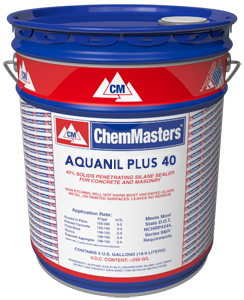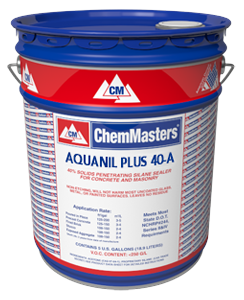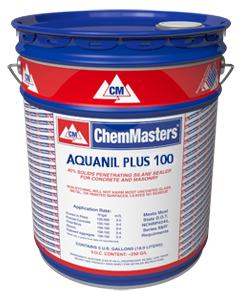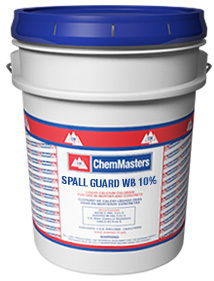Seal the Deal is intended to be an informative and educational publication for ChemMasters’ network of independent manufacturer’s representatives, distributors and contractors. We don’t want to make you chemical engineers, but we do want to help you feel better informed and more comfortable discussing construction chemicals. If there are specific products or topics you would like to see addressed in a future issue, please contact
John Fauth.
Protecting Concrete from Winter Damage
Those of us who live above the Mason-Dixon Line recognize what it means when the air becomes crisp and the leaves turn shades of red, yellow and orange. It means concrete damage is just around the corner.
Although we like to think of concrete as a "solid" material, it’s more like a stiff sponge than a solid block of stone. And like a sponge, it’s very absorptive. As a result, liquids like water readily penetrate concrete and, when exposed to freezing temperatures, that water
becomes ice. When water freezes to form ice it also expands, creating internal tensile forces on concrete that can cause it to crack.
Concrete has very high compressive strength, anywhere from 3,000 psi and beyond. Compressive strength is a measurement of how well it can withstand an external force that wants to compact it, like the weight of a car rolling over a concrete driveway. But concrete has relatively
low tensile strength… about 1/10th of is compressive strength. And the tensile forces generated by water that expands during freezing temperatures can easily cause concrete to crack, scale or delaminate. During winter months there are recurring temperature changes resulting in
frequent "freeze/thaw cycles" as snow falls, melts, is absorbed by concrete and refreezes repeatedly.
This damage can be aggravated by the use of deicing chemicals, which cause concrete to undergo additional freeze/thaw cycles as ice is melted and refrozen. Deicing chemicals can also allow concrete to become "super saturated", and hold more water than it would naturally. And of
course, more water means more expansion as it freezes.
Because this freeze/thaw cycle can be very damaging to concrete, customers are naturally anxious to protect their driveways, walkways and other concrete investments. Every fall our technical service department is bombarded with a common question… "which of your sealers is the best
protection for my concrete?"
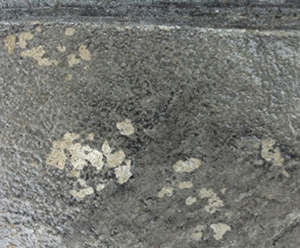
Freeze/thaw cycling and deicing chemicals can cause surface paste to scale or delaminate.
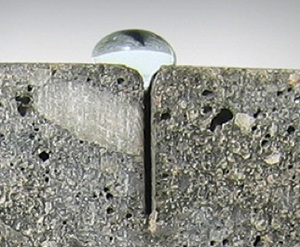
Penetrating silane and siloxane chemistries make concrete water repellant.
Freeze/thaw damage is best avoided by not allowing water into the concrete in the first place. Penetrating water repellants like silanes and siloxanes undergo a chemical reaction within concrete to form a hydrophobic (water repellant) silicone barrier. These treatments coat the
linings of concrete pores and capillaries, preventing water absorption from the surface, yet remaining "breathable" enough to allow water vapor passing through concrete to evaporate into the air.
Penetrating silanes and siloxanes also prevent the absorption of chlorides (salts) that can damage concrete and imbedded rebar. That’s an important consideration in northern states that heavily salt their roads to improve driving conditions.
And since penetrating silanes and siloxanes work below the concrete surface, they have the added benefit of not changing its appearance or slip resistance. Being below the surface also means they aren’t subject to the same abrasion and wear associated with a typical surface
coating.
Although what is "best" differs from person to person, there are many good reasons why anyone would want to consider using a penetrating silane or siloxane water repellent to protect concrete during the harsh winter months, and throughout the year.
ChemMasters makes a full line of penetrating silane and siloxane water repellants, including Aquanil Plus 40, Aquanil Plus 40-A, Aquanil Plus 100 and Spall Guard WB 10. Click on the links below to view these products.
Penetrating Silane Concrete Sealer & Waterproofer
Aquanil™ Plus 40 is a penetrating, chemically-reactive 40% solids alkyltrialkoxy silane, solvent-based silane sealer. It repels moisture and water from concrete and masonry.
Low-VOC, Solvent Based, Penetrating Silane Sealer for Concrete & Masonry
Aquanil Plus 40-A is a penetrating, chemically reactive alkyltrialkoxy, 40% solids, solvent based silane sealer that repels moisture and water from concrete and masonry.
Penetrating Silane Sealer for Concrete and Masonry
Aquanil Plus 100 is a penetrating, chemically reactive alkyltrialkoxysilane ›95% solids, solvent based silane sealer that repels moisture and water from concrete and masonry.
Penetrating Siloxane Low-VOC Water-Based Concrete Sealer & Waterproofer
SpallGuard WB-10 a penetrating, chemically reactive, solvent-free, silane modifed siloxane emulsion designed to be a moisture and water repellent for concrete and masonry.
Seal the Deal is intended to be an informative and educational publication for ChemMasters’ network of independent manufacturer’s representatives, distributors and contractors. We don’t want to make you chemical engineers, but we do want to help you feel better informed and more comfortable discussing construction chemicals. If there are specific products or topics you would like to see addressed in a future issue, please contact
John Fauth.

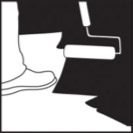 Seal the Deal
Seal the Deal

